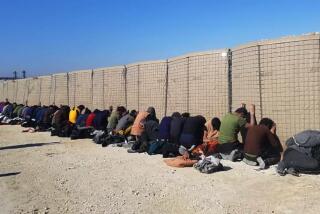Syria first lady targeted by European Union sanctions
Syrian First Lady Asma Assad, a glamorous, British-born ex-banker once thought to be at the vanguard of change in her adopted land, was hit by European sanctions Friday after embarrassing reports about shopping sprees as her husband’s forces were accused of killing civilians.
The latest round of European Union sanctions against President Bashar Assad’s inner circle came as demonstrators across the country marched to the slogan “Damascus, here we come.” The rallying cry signaled the opposition’s intention to take its campaign to oust the president to the Syrian capital, largely insulated from the unrest sweeping the nation.
Meanwhile, opposition activists reported another day of bloodshed and upheaval in the yearlong uprising, with renewed shelling of the central city of Homs, attacks on protesters in the capital and battles in various hot spots that government opponents said left dozens more dead.
For months, the United States and Europe — demanding Assad’s ouster but hesitant to intervene in the Syrian crisis — have been imposing economic sanctions as a means of isolating Syria’s government.
The European Union on Friday stepped up the pressure in a very personal way, slapping a travel ban and an assets freeze on Asma Assad, 36, and several other family members, including the president’s powerful mother, Anisa Makhlouf, his sister and sister-in-law. Previous EU sanctions targeted the president; his younger brother, Maher, a military commander; and other relatives.
But public attention Friday focused on moves against the Syrian first lady, a mother of three who has seen her reputation plummet from elegant, would-be reformer to something of an international pariah. She has kept a low profile during the revolt, standing by her husband but staying out of the limelight.
Last week, however,London’sGuardian newspaper published leaked emails apparently from Syria’s first family that highlighted, among other things, Asma Assad’s passion for crystal-encrusted French stiletto heels, British country furnishings and a certain chocolate fondue set on sale on Amazon.com. The disclosures were another punishing public relations blow for a government already dealing with an armed insurgency, global condemnation and a crumbling economy.
The first lady’s pricey purchases tended to overwhelm more consequential revelations in the email cache, such as her husband’s seemingly contemptuous dismissal of democratic reforms as “rubbish laws of parties, elections, media.”
President Assad, whose family has ruled Syria for more than 40 years, has publicly pledged his commitment to a reform process, though opponents have dismissed his steps as stalling tactics designed to buy time and hang on to power.
The travel ban means the Syrian first lady and others named will be barred from visiting European Union countries, though Asma Assad, as a British national, still has the right to enter Britain. Officials said she was unlikely to head there any time soon.
“We’re not expecting Mrs. Assad to try to travel to the United Kingdom,” British Foreign Secretary William Hague deadpanned to reporters.
Whether the latest round of sanctions will have any effect beyond the symbolic is unclear. But U.S. and European officials say the penalties add to the cumulative pressure on Assad to abandon power.
Assad, however, has resolutely vowed never to resign. By all accounts, the Syrian president maintains a core of support within the nation, particularly among minorities, business elites and secular Syrians worried about the prospect of Iraq-style chaos and sectarian bloodletting should the government fall.
A special peace envoy, former United Nations Secretary-General Kofi Annan, is pushing a plan that calls for a cease-fire, access for humanitarian aid and a national dialogue leading to a democratic government in Syria. The plan does not call for Assad to relinquish power, unlike an Arab League proposal endorsed by the U.S. and its European allies.
Annan is scheduled to travel this weekend to Russia and China, two nations that have resisted U.S.-backed efforts to force Assad from office. Both Moscow and Beijing have backed Annan’s peace blueprint.
In Syria, the Local Coordination Committees, an opposition network, reported at least 36 people killed in clashes, shelling and other confrontations with security forces Friday. The dead included 14 in the central provinces of Homs and Hama, nine in southern Dara, four in the northwestern province of Idlib, three in the northern zone of Aleppo and two in the suburbs of Damascus.
Dissident activists released several videos purporting to show government helicopters attacking the opposition, but the content could not be verified.
The state-run news agency reported that “terrorist” attacks killed at least three security service members outside the city of Aleppo, while authorities killed a number of “most wanted terrorists” in fighting in Idlib province. Authorities also discovered a bomb-making factory in Idlib, the state news agency said.
The death toll could not be independently confirmed because monitors and journalists are restricted in Syria.
The revolt has left at least 10,000 dead, according to United Nations and Syrian government figures.
Special correspondent Alexandra Sandels contributed to this report.
More to Read
Start your day right
Sign up for Essential California for news, features and recommendations from the L.A. Times and beyond in your inbox six days a week.
You may occasionally receive promotional content from the Los Angeles Times.





